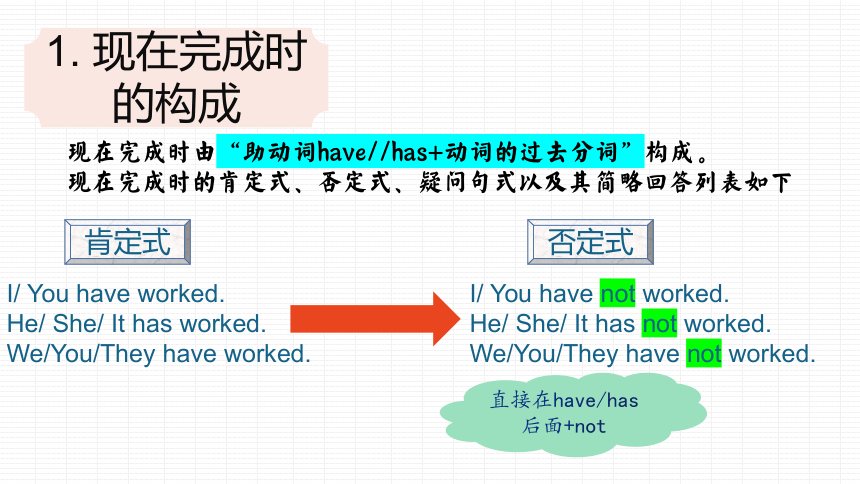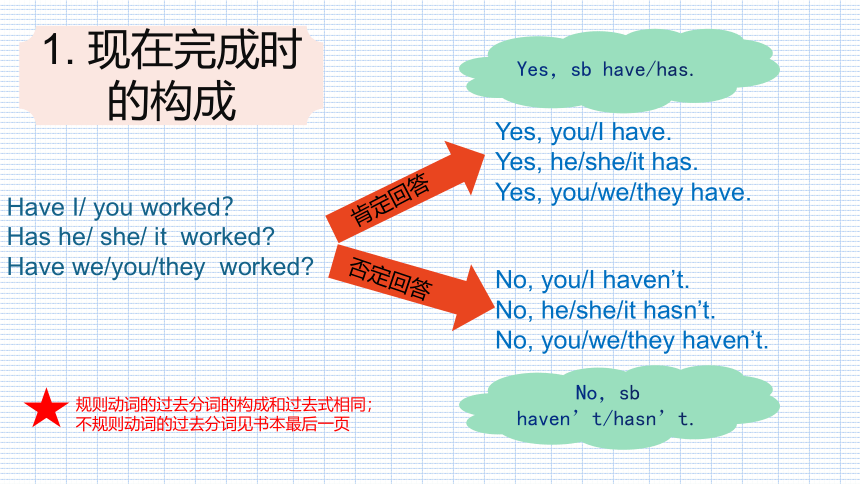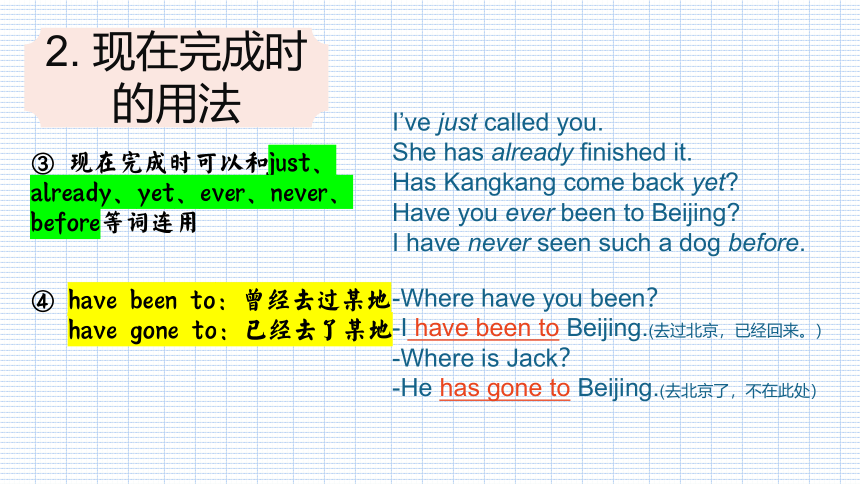仁爱九上Unit 1 The Changing World语法---现在完成时(共13张PPT)
文档属性
| 名称 | 仁爱九上Unit 1 The Changing World语法---现在完成时(共13张PPT) |  | |
| 格式 | zip | ||
| 文件大小 | 21.0MB | ||
| 资源类型 | 教案 | ||
| 版本资源 | 仁爱科普版 | ||
| 科目 | 英语 | ||
| 更新时间 | 2022-08-18 17:03:07 | ||
图片预览






文档简介
(共13张PPT)
现在完成时
九年级一单元语法
1. 现在完成时的构成
现在完成时由“助动词have//has+动词的过去分词”构成。
现在完成时的肯定式、否定式、疑问句式以及其简略回答列表如下
I/ You have worked.
He/ She/ It has worked.
We/You/They have worked.
I/ You have not worked.
He/ She/ It has not worked.
We/You/They have not worked.
肯定式
否定式
直接在have/has后面+not
1. 现在完成时的构成
肯定式
I/ You have worked.
He/ She/ It has worked.
We/You/They have worked.
一般疑问句
Have I/ You worked?
Has he/ she/ it worked
Have we/you/they worked
直接把have/has提前,首字母大写
1. 现在完成时的构成
Have I/ you worked?
Has he/ she/ it worked
Have we/you/they worked
肯定回答
否定回答
肯定回答
否定回答
Yes, you/I have.
Yes, he/she/it has.
Yes, you/we/they have.
No, you/I haven’t.
No, he/she/it hasn’t.
No, you/we/they haven’t.
Yes,sb have/has.
No,sb haven’t/hasn’t.
规则动词的过去分词的构成和过去式相同;不规则动词的过去分词见书本最后一页
2. 现在完成时的用法
① 表示过去发生或者以及发生的某一动作对现在造成的影响或后果
Have you found him yet?
No, he has probably gone home.
(现在不在这里)
② 表示开始于过去并持续到现在的动作或状态,可以和表示从过去某一时刻延续到现在(包括现在在内)的一段时间的状语连用。表示持续动作或状态的动词多是延续性动词。
I haven’t seen her these days.
He has taught us since I came this school.
How long have you been like this
2. 现在完成时的用法
③ 现在完成时可以和just、already、yet、ever、never、before等词连用
I’ve just called you.
She has already finished it.
Has Kangkang come back yet
Have you ever been to Beijing
I have never seen such a dog before.
④ have been to:曾经去过某地
have gone to:已经去了某地
-Where have you been?
-I have been to Beijing.(去过北京,已经回来。)
-Where is Jack?
-He has gone to Beijing.(去北京了,不在此处)
3. 短暂性动词的完成时态
短暂性动词的完成时态不能和表示一段时间的时间状语连用,当它需要与表示一段时间的时间状语连用时,通常需要进行词语转化,转化形式如下
buy--have come--be get to know--know
begin--be on catch a cold--have a cold
marry--be married borrow--keep
die--be dead leave--be away (from)
close--be closed fall ill--be ill
join--be a member of/ be in
3. 短暂性动词的完成时态
The film has been on for half an hour.
The film has begun on for half an hour.
I have bought the book for two months.
I have had the book for two months.
3. 短暂性动词的完成时态
短暂性动词+过去式可与完成时进行同义句转换
I left Chongqing two months ago.
I have been away from Chongqing for two months.
The old man died last year.
The old man has been dead for a year.
3. 短暂性动词的完成时态
注:短暂性动词的完成时态在否定句中可与表示一段时间的状语连用。
I haven’t seen him for a long time.
我已经很久没有看到他了。
4. 现在完成时和一般过去式的区别
① 现在完成时
② 一般过去时
表示过去发生或已经发生的动作对现在造成的影响或结果,强调的是现在的情况。所以不能直接和表示过去某一时间的时间状语连用,如:yesterday;three days ago;in 2008等。
只表示过去发生的动作或状态,和现在不发生联系,,强调的是过去的情况。它可以直接和表示过去某一时间的时间状语连用。
4. 现在完成时和一般过去式的区别
I have been to Beijing. 我去过北京。(我对北京有所了解)
I went to Beijing last year. 我去年去过北京。(不涉及现在)
She has lived here since 2000. 2000年以来她一直住在这。(她现在还住在这儿)
She lived here in 2000. 2000年她住在这。(不涉及是否现在还住在这儿)
Thank you!
现在完成时
九年级一单元语法
1. 现在完成时的构成
现在完成时由“助动词have//has+动词的过去分词”构成。
现在完成时的肯定式、否定式、疑问句式以及其简略回答列表如下
I/ You have worked.
He/ She/ It has worked.
We/You/They have worked.
I/ You have not worked.
He/ She/ It has not worked.
We/You/They have not worked.
肯定式
否定式
直接在have/has后面+not
1. 现在完成时的构成
肯定式
I/ You have worked.
He/ She/ It has worked.
We/You/They have worked.
一般疑问句
Have I/ You worked?
Has he/ she/ it worked
Have we/you/they worked
直接把have/has提前,首字母大写
1. 现在完成时的构成
Have I/ you worked?
Has he/ she/ it worked
Have we/you/they worked
肯定回答
否定回答
肯定回答
否定回答
Yes, you/I have.
Yes, he/she/it has.
Yes, you/we/they have.
No, you/I haven’t.
No, he/she/it hasn’t.
No, you/we/they haven’t.
Yes,sb have/has.
No,sb haven’t/hasn’t.
规则动词的过去分词的构成和过去式相同;不规则动词的过去分词见书本最后一页
2. 现在完成时的用法
① 表示过去发生或者以及发生的某一动作对现在造成的影响或后果
Have you found him yet?
No, he has probably gone home.
(现在不在这里)
② 表示开始于过去并持续到现在的动作或状态,可以和表示从过去某一时刻延续到现在(包括现在在内)的一段时间的状语连用。表示持续动作或状态的动词多是延续性动词。
I haven’t seen her these days.
He has taught us since I came this school.
How long have you been like this
2. 现在完成时的用法
③ 现在完成时可以和just、already、yet、ever、never、before等词连用
I’ve just called you.
She has already finished it.
Has Kangkang come back yet
Have you ever been to Beijing
I have never seen such a dog before.
④ have been to:曾经去过某地
have gone to:已经去了某地
-Where have you been?
-I have been to Beijing.(去过北京,已经回来。)
-Where is Jack?
-He has gone to Beijing.(去北京了,不在此处)
3. 短暂性动词的完成时态
短暂性动词的完成时态不能和表示一段时间的时间状语连用,当它需要与表示一段时间的时间状语连用时,通常需要进行词语转化,转化形式如下
buy--have come--be get to know--know
begin--be on catch a cold--have a cold
marry--be married borrow--keep
die--be dead leave--be away (from)
close--be closed fall ill--be ill
join--be a member of/ be in
3. 短暂性动词的完成时态
The film has been on for half an hour.
The film has begun on for half an hour.
I have bought the book for two months.
I have had the book for two months.
3. 短暂性动词的完成时态
短暂性动词+过去式可与完成时进行同义句转换
I left Chongqing two months ago.
I have been away from Chongqing for two months.
The old man died last year.
The old man has been dead for a year.
3. 短暂性动词的完成时态
注:短暂性动词的完成时态在否定句中可与表示一段时间的状语连用。
I haven’t seen him for a long time.
我已经很久没有看到他了。
4. 现在完成时和一般过去式的区别
① 现在完成时
② 一般过去时
表示过去发生或已经发生的动作对现在造成的影响或结果,强调的是现在的情况。所以不能直接和表示过去某一时间的时间状语连用,如:yesterday;three days ago;in 2008等。
只表示过去发生的动作或状态,和现在不发生联系,,强调的是过去的情况。它可以直接和表示过去某一时间的时间状语连用。
4. 现在完成时和一般过去式的区别
I have been to Beijing. 我去过北京。(我对北京有所了解)
I went to Beijing last year. 我去年去过北京。(不涉及现在)
She has lived here since 2000. 2000年以来她一直住在这。(她现在还住在这儿)
She lived here in 2000. 2000年她住在这。(不涉及是否现在还住在这儿)
Thank you!
同课章节目录
- Unit 1 The Changing World
- Topic 1 Our country has developed rapidly.
- Topic 2 The population in developing countries is
- Topic 3 The world has changed for the better.
- Unit 2 Saving the earth.
- Topic 1 Pollution has causes too many problems.
- Topic 2 All these problems are very serious.
- Topic 3 What can we do to protect the environment
- Unit 3 English around the World
- Topic 1 English is widely spoken around the world.
- Topic 2 Some things usually have different meaning
- Topic 3 Could you give us some advice on how to l
- Unit 4 Amazing Science
- Topic 1 When was it invented?
- Topic 2 I'm excited about the things that will be
- Topic 3 China is the third nation that sent a pers
